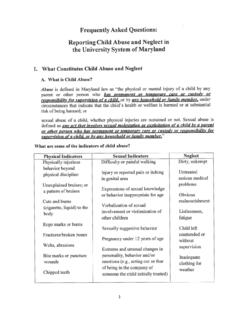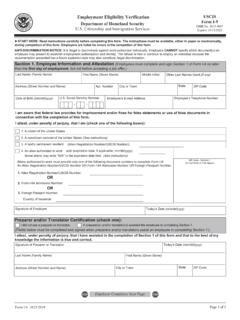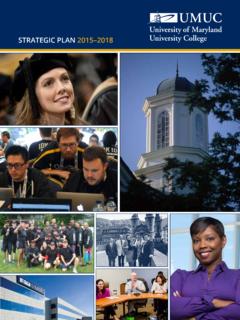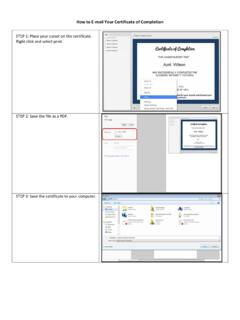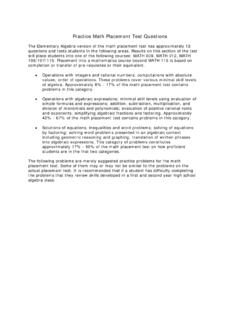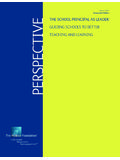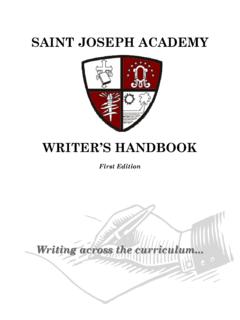Transcription of 1 Academic Integrity Tutorial - UMUC
1 1 This content is available under a Creative Commons Attribution-NonCommercial ShareAlike license. Copyright 2015, UMUC. 1 academic integrity tutorial Quote The mark of an educated person is the ability to learn from others and use that knowledge to develop new ideas and approaches, always remembering to credit those who led the way on their intellectual path. This is the essence of what it means have Academic Integrity . Marie A. Cini, PhD, UMUC Provost Welcome My name is Brian (picture of a man) and I will be your guide today.
2 Academic Integrity has been an issue many colleges and universities continue to address. Academic Integrity affects almost every area of our daily lives. Fabricated or falsified data can have a devastating impact on business and public policy, as well as the Academic community. This course will provide you with all the necessary information you need to make informed decision about Academic Integrity . Course Navigation Information about navigating through the slides, not applicable to this transcript.
3 Meet Yasmin Meet Yasmin (picture of a woman) who took time off from school to save money for college. Now, she is ready to get her bachelor s degree but needs some help as she prepares to write a research paper. Yasmin must ensure her paper reflects the highest Academic Integrity . The information in these modules will show how Yasmin can articulate her own ideas while still crediting others. Let s start by learning the basics about Academic Integrity . Module 1: Learning the Basics The objectives for this module are: 1.
4 Define Academic Integrity and list the reasons why it is important. 2. Define plagiarism and recognize when a piece of writing has been plagiarized. 3. Identify reasons why citing is important. What is Academic Integrity Academic Integrity is defined as the honest and responsible pursuit of scholarship. Academic Integrity is characterized by a. Completing exams and other Academic assignments in an honest way b. Presenting truthful and accurate data and research information in Academic assignments c.
5 Avoiding plagiarism by properly incorporating and acknowledging sources The reputation of a school and assessment of student work depend on Integrity . 2 Test Your Knowledge Which of the following is NOT a vital characteristic of Academic Integrity ? a. Completing Academic assignments in an honest manner b. Having school and departmental policies that are exactly alike c. Properly incorporating and acknowledging sources d. Presenting accurate and truthful data and research information Answer: B.
6 Having school and departmental policies that are exactly alike is NOT a vital characteristic of Academic Integrity . Activities that are considered plagiarism can vary according to school and departmental policies. Why Does Academic Integrity Matter? It s vital to being a part of the Academic community. Consequences for failing to give credit to sources can be severe. Violating your school s Academic Integrity policy may lead to suspension or expulsion. As a member of the Academic community, it is important to build and uphold a positive reputation.
7 Violating a school s Academic Integrity policy only hurts the student. Introduction to Plagiarism Yasmin understands the importance of Academic Integrity but would like to learn more about how it relates to plagiarism. Plagiarism is a term that is closely related to Academic Integrity because it deals with dishonesty. What is Plagiarism? Plagiarism occurs when you present another person s ideas, intentionally or unintentionally, as your own. In the MLA Style Manual and Guide to Scholarly Publishing, Joseph Gibaldi likens plagiarism to intellectual theft, because it gives the impression that you wrote or thought something that you in fact borrowed from someone, and to do so is a violation of professional ethics (165).
8 It is your responsibility as the student to avoid plagiarizing. As a scholar, you are expected to credit the sources of ideas that you use in your own work. Test Your Knowledge Which of these statements is TRUE concerning plagiarism? a. Plagiarism occurs only when a student intentionally presents someone else s ideas as his or her own. b. Recognizing the creators of works is the only reason the Academic community condemns plagiarism. c. Plagiarism is in no way considered theft or akin to stealing.
9 D. It is solely the responsibility of the student to avoid plagiarism. Answer: D. It is solely the responsibility of the student to avoid plagiarism is the TRUE statement concerning plagiarism. 3 What Counts as Plagiarism? Submitting a paper written by someone else This is considered a form of fraud Using words and phrases from the source text and patching them together in new sentences This is called patch-writing. Some schools policies and instructors consider this plagiarism, while others may not, so be sure to check.
10 Failing to acknowledge the sources of words or information This can also be considered a sign of fraud. Not providing quotation marks around a direct quotation This leads to the false assumption that the words are your own. Why Do Citations Matter? A citation is recognition of an authoritative source for substantiation. Citing and acknowledging sources distinguishes original work from borrowed work. Well-written citations help readers to locate information and conduct further research.

